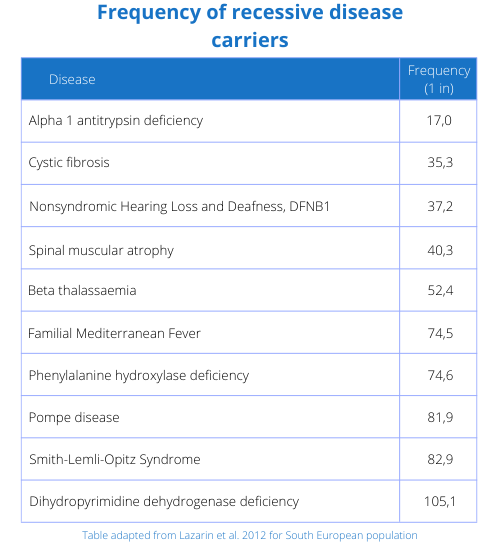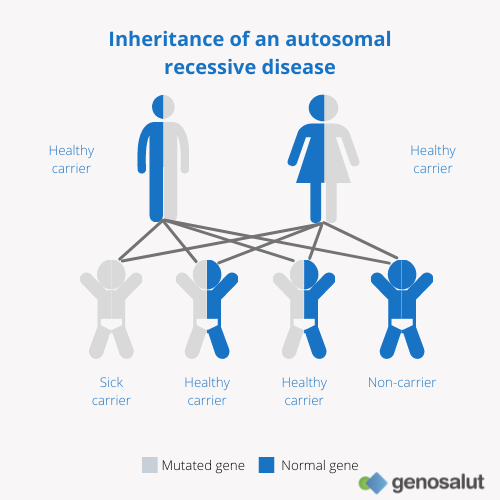Carrier screening
With the help of carrier analysis, couples who wish to have children can be screened for the presence of a carrier of serious genetic diseases. Even if both parents are healthy, they may be carriers of predispositions that lead to a serious disease in their children.
Price
From 180€ (includes genetich counselling)
Time to result
From 3 weeks, depending on the test
Why is carrier screening worthwhile?

In the general population, each person carries an average of 2.8 recessive mutations that are the cause of known serious diseases in childhood.
With the help of carrier screening, couples wishing to have children can be screened for the presence of a carrier of severe genetic diseases. Even if both parents are healthy, they may be carriers of predispositions that cause serious disease in their children.
Although Mendelian diseases are rare in the general population, when grouped together they account for approximately 20% of infant mortality and approximately 10% of paediatric hospitalisations.
Carrier testing can therefore help couples to make an informed decision and choose their family planning. If mutations in the same gene are detected, the couple may choose to:
- Carry out prenatal diagnostics or, if necessary, preimplantation diagnostics in case of severe diseases.
- Make appropriate preparations for pregnancy and childbirth and consult specialists.
- Take the therapeutic measures already available for each disease in good time.
At Genosalut we offer the following carrier analyses
At Genosalut we offer advice and personalised tests (selection of genes and scope of diagnosis) that are adapted to the family history, origin and need for safety of our patients. This is why we carry out both selective and extended carrier analysis.
Selective carrier analysis
Selective testing is focused on analysing a specific gene and can be performed if there is a known pathogenic variant in the family.
Extended Carrier Analysis
It analyses more than 360 diseases and 4,000 variants by next-generation sequencing (NGS) and other molecular biology techniques to detect pathogenic variants that cannot be determined by NGS.
This extended carrier analysis performs the complete sequencing of all the genes studied, has been designed according to the criteria of the best health organisations and is constantly updated.
Our value proposal
Experience
At Genosalut, we have more than 10 years of experience in counselling people with conditions where a genetic cause has been identified or is thought to be possible.
Proximity
We are a close laboratory, we respond personally and we take the time to explain the report in detail to doctors and patients.
Professional interpretation of results
Because of our knowledge and experience, we are able to accurately interpret genetic results and offer professional advice.
Reference in the field
We are the point of contact for patients, doctors and clinics in all areas of human genetic diagnostics and prevention.
How is an autosomal recessive disease inherited?
Humans have two copies of each gene, half of these copies are inherited from the mother through the egg and the other half from the father through the sperm. In cases of autosomal recessive inheritance, both parents carry a heterozygous mutation (affecting only one of their two copies) in the same gene. The parents are healthy because they have a second functional gene copy.
If both partners carry a recessive mutation of the same disease, they have a 25% risk of their child inheriting the mutation and having the disorder. For 50% of children, there is also a risk of being a carrier without contracting the disease. 25% of the children are not carriers of the mutation and therefore cannot pass the mutation on to their offspring.
If only one partner is a carrier, there is a 50% chance that the child will carry the disorder. As a rule, he or she will not develop the disease.
Prevention and peace of mind with Genosalut carrier screening
Helping you to make an informed decision and choice in family planning
If mutations in the same gene are detected in both partners, and depending on when the test is performed, the parents can opt for different possibilities, including: pre-implantation diagnosis, prenatal diagnosis, adoption, termination of pregnancy and/or taking the therapeutic measures already available for the respective disease. The basis for this is detailed information about the expected clinical picture, if necessary also contact with affected families and also the mediation of psychosocial counselling offers, so that the couple can make the presumably correct decision in their individual life situation with regard to further family planning.
You will know if you can pass on the risk to your offspring.
If mutations in one or more genes are detected in one partner, 50% of the offspring may also be (healthy) carriers of the mutation(s). Such knowledge may be important for future family planning.
How can I request a carrier screening?
Request an appointment
Contact us through the form, by e-mail or by telephone to make an appointment with us.
Ask your physician
You can also consult your doctor for information on the possibilities of genetic testing.
We analyse the probe
In our genetic diagnostics laboratory we analyse the sample with the latest technology.
We write a report
We provide a detailed description of the results and, if necessary, genetic counselling.
FAQs
What is carrier screening?
It is a genetic study that makes it possible to determine whether a person is a carrier of a known mutation responsible for a specific disease. The fact that a person is a carrier of a mutation does not confer the risk of suffering from it, but it can cause serious problems in their offspring.
What is a carrier?
A carrier is a person who has a defective copy (a mutated allele) of a gene associated with a particular disorder. Humans have two copies of each gene (with the exception, in men, of some genes located on the X chromosome, which are not present on the Y chromosome), and in most cases, one copy in good condition is sufficient for the proper functioning of our organism. Carriers are usually unaware that they are carriers, as they have no symptoms or only mild symptoms.
When can carrier screening be performed?
Carrier testing can be done either before or during pregnancy. If testing is done before pregnancy, there is a wider range of options and more time to make decisions. For example, if a risk of severe genetic disease is identified, pre-implantation diagnosis can be considered. If the test is performed during pregnancy and a high risk of a serious genetic disease is identified, the couple still has a number of options.
What is a recessive disease?
Most carrier screening tests are for recessive disorders. This type of disorder only occurs if a person has inherited two defective copies (two mutated alleles) of a gene (one from the mother and one from the father).
What are the most common autosomal recessive diseases?
In Europe, the most common autosomal recessive disease is cystic fibrosis. The disease causes destruction of the lung structure and reduced physical resilience due to inflammation of the airways. The prognosis for those affected has improved considerably due to medical advances, including lung transplantation.
Spinal muscular atrophy is another common autosomal recessive disease. It is characterised by progressive degeneration of nerve cells in the spinal cord. Despite advances in treatment, the prognosis for many patients remains poor.
What is an X-linked recessive disease?
An X-linked recessive disease is a disease that is inherited through the X chromosome. Since males only have one X chromosome (their other sex chromosome is the Y chromosome), if they inherit the defective copy from their mother, they only have that copy and manifest the recessive disease.
If the mother is a carrier, there is a 25% risk that she will have a male child with the disease. At the same time, 50% of the offspring (boys and girls) are healthy and are not carriers. 25% of the offspring are healthy girls who are carriers like the mother or are mildly affected (e.g. in Fragile X syndrome).
Situations where both members are carriers do not usually occur, as in the case of boys they would manifest the disease.
What does the existence of an autosomal recessive disease mean for a child?
The various autosomal recessive diseases cause a wide variety of clinical pictures with a wide variety of prognoses.
- Some are not compatible with normal embryonic development (survival) and result in the death of the foetus already during pregnancy (miscarriage).
- Other diseases can lead to severe congenital, mental or physical disability.
- In some cases, life expectancy and quality of life are practically unaffected if therapeutic measures are taken in time; for other diseases, there are no treatment options.
In certain circumstances, the risk of developing a disease may be detected at a later stage of life, which does not affect life expectancy, but for which there are nevertheless no or very limited treatment options.
Consequently, the considerations and consequences for couples in case of an abnormal test result vary.
What does a carrier analysis test look like?
To determine whether either partner is a carrier of a disease-associated mutation, a blood or saliva sample is required. This test will be analysed using molecular techniques to determine whether either partner is a carrier of a recessive disease-associated mutation.
What options does a couple have if they are both carriers of a genetic disorder?
If a predisposition for the same autosomal recessive disease is found in both partners, this means a risk of 25% per pregnancy for the occurrence of this disease. The options depend on the timing of the test, the individual decision of the couple and the legal possibilities in the country.
- If the test is performed before pregnancy and the possibility of a serious genetic disease is detected: Preimplantation diagnosis is possible. In this case, the embryo is examined at an early cellular stage within the framework of in vitro fertilisation to determine whether the mutation is present in both copies of the gene. Only unaffected embryos are used. It is limited to severe diseases and must be approved in advance by an ethics committee in Spain.
- If the test is performed during pregnancy: The genetic material of the foetus is examined by prenatal testing for the presence of the disease.
How much does carrier screening cost?
You can contact us and we will inform you about the costs of carrier analysis.
Who covers the costs of counselling and carrier analysis?
As a general rule, genetic counselling is not covered by any type of health insurance.
Genetic tests are covered by some private insurance companies and sometimes depend on certain criteria (patient’s medical history, family history, abnormal findings in ultrasound scans, etc.). You can come to us with a certificate from your doctor or with your insurance card.
Request an appointment with us
Opening hours
Monday to Friday from 9.00 am to 1.00 pm
+34 616 59 01 65
info@genosalut.com
Camí dels Reis, 308 (Clínica Palma Planas)
Contact form
Reasons for trusting Genosalut
First genetic diagnosis laboratory in the Balearic Islands
Professionals with experience in medical genetics
Detailed report of the results
Personalised attention for each patient
Wide range of genetic tests
Cutting-edge technology

